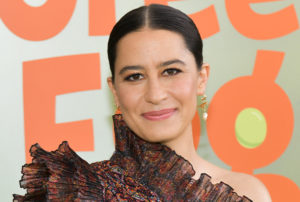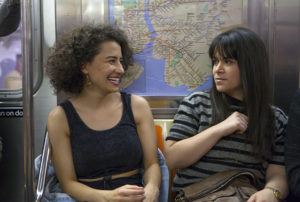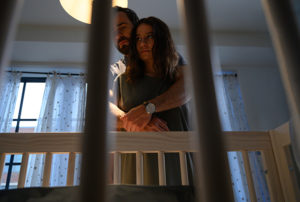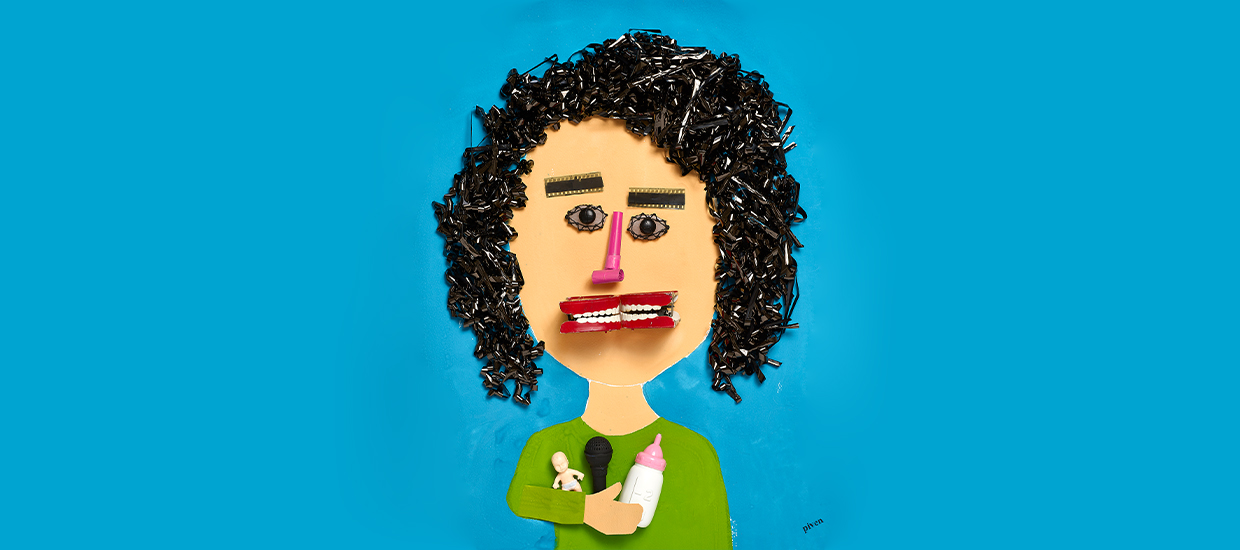For millennial women—in particular those who spent their 20s hustling in big cities—Ilana Glazer is something of a patron saint. Broad City, the hit Comedy Central series she created with her best friend, Abbi Jacobson, depicted the daily struggles, hijinks, and eventual maturation of two 20-something best friends in New York. The show was also a groundbreaking feminist interpretation of the stoner buddy comedy, and a celebration of sexual fluidity. Glazer and Jacobson played exaggerated versions of themselves, and, for the most part, Glazer’s other work, from her role in the dark bachelorette comedy Rough Night to her 2020 standup special, The Planet Is Burning, hasn’t strayed far from that iteration of “Ilana.”
So her latest role, in the horror film False Positive (streaming on Hulu starting June 25), which she also cowrote, feels like a drastic departure. “It’s so different, and to share myself in that way is really freaky,” she admits, calling from her home in Brooklyn. Glazer plays Lucy, a young woman who seems to have it all—handsome doctor husband (Justin Theroux), luxurious apartment, steady marketing job—but is struggling to get pregnant. After visiting a renowned fertility doctor (Pierce Brosnan), she’s excited to find herself pregnant, but the good news isn’t quite what it seems.
In a stroke of cosmic timing, Glazer, 34, now happens to be pregnant herself; in fact, her estimated due date aligns almost perfectly with the movie’s release. “COVID pushed the release of this movie back twice, so I really was not planning to be pregnant when it came out,” she says, laughing. “It’s so bizarre and weird.”

False Positive is such a departure for you. How did you get involved, and what about the story appealed to you?
I got to know John Lee, my cowriter and director, through Broad City. I was a big fan of his because he had this cult show, Wonder Showzen, on MTV when I was in college that was mind-blowing for me. He and I became friends, and at one point he told me about this weird fever dream of a script about pregnancy, or, at the time, it was about miscarriage. It was really freaky and moody, but I had this feeling about it, like I could see the shape that it could hold. I think pregnancy medicine, mortality rates—mortality rates as they reflect systemic racism in this country—IVF, all these conversations have been coming up in the past few years, but I don’t think they have bubbled over at all. I think the conversation when it comes to the female body is so slow, and there’s no infrastructure really to talk about it in this country. So I hope this movie pushes the conversation further. I feel so lucky to have the opportunity to make art and then see where the world meets you along the way.
I thought it was interesting that your character, Lucy, is a victim in so many ways, but the movie also looks very critically at her privilege as a wealthy, straight white woman.
It was so exciting to me that we got to make this in New York, because I’ve been super-fascinated in the past few years to look around New York City and see just how deep in this system we are. We point to ourselves as this progressive city, but the wealth gap alone points to how backward we are. In America, a Black woman is four times as likely as a white woman to die while giving birth [or because of pregnancy-related complications]. In New York, she’s 12 times as likely. Twelve times. That is the area of fascination, to me, in Lucy. I think we think of privilege as affording consciousness, but sometimes it just affords more expensive distraction. And because Lucy’s life looks like the lives in magazines and on Instagram and on TV, she’s actually further from her own truth than somebody who doesn’t live in as much daily privilege as she does.
I noticed a lot of parallels to Rosemary’s Baby, and I was wondering if there were other horror films that inspired you while writing this?
[The film] is very much like Rosemary’s Baby, and I’m laughing about it now, but it’s horrible—the real horror behind Rosemary’s Baby is that Roman Polanski created it. It’s this gorgeous, brilliant, lean, tightly written, elegantly executed movie. And still, Roman Polanski is a real monster. So the horrors of Rosemary’s Baby, both on-screen and behind the camera, were an inspiration. And while we were in the process of making this movie, Get Out came out, and that was a huge inspiration for me. I love that movie, and I loved to see Jordan Peele go from a Comedy Central show to a horror movie. And also The Babadook—have you seen that movie?

I haven’t, but it’s also about motherhood, right?
It’s about motherhood, but—I think it came out in 2014, and it was really ahead of its time in the psychoanalytic nature of its horror. I just love that movie.
You mention Jordan Peele’s transition from comedy to horror. Were you drawn to this project because it’s so different from everything else you’ve done?
I wish I had more of what I think of as a design sense, when people look at their career and think, “Well, I’ve done this, so I should do this next.” It’s a brilliant way of operating, to be able to remove one’s self from their career and design it in a particular way. At this point, I’m more operating from the gut.
Did working on this film influence the way you think about your own pregnancy at all?
When I was writing this movie, the pregnancy seemed like a horror, and birth seemed like a horror to me, because it’s so hard and unknown and uncertain, from the physical elements to the social elements. And John’s horror of birth was the helplessness that men embody as partners of pregnant people. You know, what the hell can they do, even? Like, they can carry the garbage down more. There’s nothing to do other than watch your partner struggle and suffer, and they just feel like they have no idea of what their partner’s going through. Now that I am pregnant, it’s a lot less scary than I thought. I was really sick for months, and I was on set working on a show, and I was just like, it’s incredible that so many pregnant people just go to work and make s*** work. My husband has been seeing flashes of False Positive a lot more throughout my pregnancy, because for him it’s still a representation.

Because it doesn’t seem real to him yet?
Yeah. Because of COVID, partners can’t come with you to the doctor, so I’ve been FaceTiming him into the sonogram, and he keeps being like “Ahh, False Positive, yikes!” and I’m not even thinking about it, because the baby’s inside me. I’m the one at the doctor’s office. But he’ll catch up when the baby’s here.
I feel like this baby is going to give you lots of fodder for future standup bits. Which reminds me, I saw an interview you did to promote your 2020 standup special, The Planet Is Burning, in which you talked about how comedians are “modern-day philosophers,” while “the people who are supposed to be serious are clown-like.” After everything that’s happened this past year, I’m curious if you still feel that way?
I do see it the same way. I started comedy when I was 19—2006 was when I really entered the scene and started doing comedy every night. And even then, I started seeing this movement toward that kind of intersection, with political leaders or cultural leaders and comedians crossing and passing each other in the seeds of culture in this new way. I think we will continue going in that direction. I think that surrealism is coming from living in late-stage capitalism. This system that we’ve been living in for so long is clearly not working, and consciousness is rising about it. I think that’s why this change is happening, why comedy is being turned on its head: Seriousness has been turned on its head.
What other projects are you working on these days?
I’ve been racing to tie things up before I take maternity leave. Because of COVID, I’ve really stepped back from standup, but I acted in The Afterparty, an Apple TV+ show by the amazing creator and producer duo [Phil] Lord and [Chris] Miller. I’ve been developing stuff with my production company, Starrpix, where I have a team of really brilliant females, so I’m excited for them to have some space without me. And I’m continuing to work on my activism and advocacy platform, Generator Collective. I’m sort of just trying to push things to a certain point so that I can work on the best project of all—a baby!




